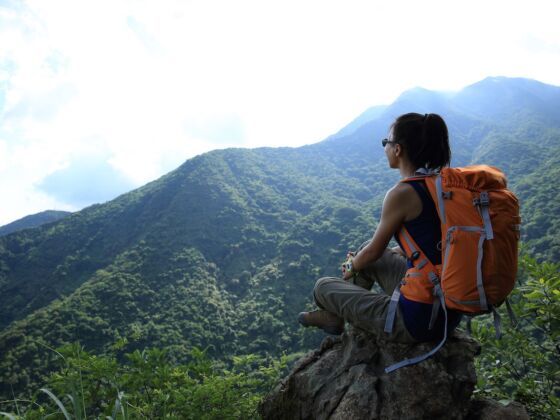EARLIER THIS YEAR, Matador Sports reported on blind hiker Mike Hanson’s attempt to thru-hike the Appalachian Trail, which I’ve been following since he took off in March. Currently somewhere in Pennsylvania (over halfway through the hike), Mike and filmmaker Gary Steffens have encountered bad weather and sickness, but they continue to trek on.


On Being an Athlete: Why Do We Believe We Can't Do It?
I also started following the news of Trevor Thomas, who is leading Team Farsight on a thru-hike of the 2,650-mile Pacific Crest Trail.
Most people find these stories newsworthy because Mike and Trevor are blind. That is not to say that being blind should in any way prevent a person from completing something physically challenging; it just makes a difficult task even more challenging. But I also think it might be something else that draws us to these stories, and that’s the idea that “if they can do it, so can I.”
For me, that thought occurred one bone-chilling winter day when I randomly made the decision to run a marathon. I’d run a few 5ks in my time, but I wasn’t a strong runner, and I hadn’t actually done any running for several months. Within 24 hours I’d found a training program and signed up for a race the following August. So began my journey to train for and complete a marathon.
When I told people I was training for a marathon, most of them applauded my efforts but said that they could never run a marathon. My question to them was always, “Why not?”
I think a lot of people don’t give their bodies enough credit for what they are capable of doing. When we hear stories about hikers like Mike and Thomas, I like to think that, on some level, we realize that these people are humans first and athletes second. If they can achieve human-sized things, we ask ourselves, why can’t we?
I’ve met a handful of people throughout my life who have no good reason to get up in the morning. Their bodies are physically depleted from medical maladies, and were they to give up instead of keep trying, few people would fault them for it. When I spend time with these people, or I read the updates about Mike’s trek, it reminds me that I can do things that may seem impossible.
My marathon has come and gone, as have other races that I’ve participated in, and after every event, I let my body deflate into a pile of lazy skin. I struggle through an hour of yoga. I can’t find the motivation for an after-dinner walk. Working out loses its appeal.
Then the cycle to become an athlete begins again. I read about a fellow Matador Sports colleague’s experience in an adventure race or the story of a 72-year-old triathlete.
I read old journals I wrote about my own training, and I realize that I can hike or run long distances too, learn new physical skills, and attempt sports I’ve never played before.
It’s times like these when I realize we need to believe in what our bodies can do. They’re built to move and explore. It’s our minds that tell us what we can’t do. There’s something about the little voice in the back of my head that has me convinced that, even though I have a built-in machine to do the physically impossible, I can’t achieve physical greatness.
So shut up, voice. I can be an athlete too.
Community Connection
Made the trip from couch potato to athlete? Tell us about it in the comments.